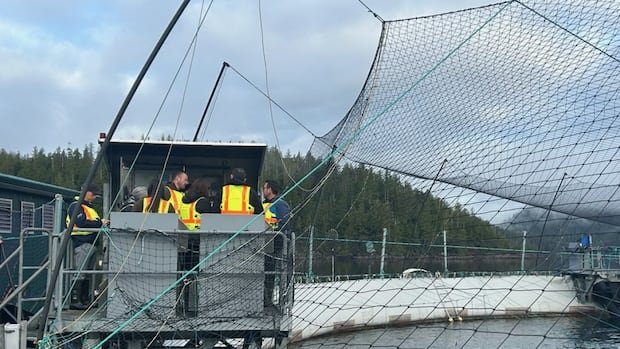A hereditary chief from the Ahousaht Nation is urging the Canadian government to reverse its decision to prohibit open-net fish farms along the British Columbia coast. The ban, initially set for 2025, was postponed to June 2029 by the federal fisheries minister following concerns raised by environmentalists and several First Nations about the potential transmission of diseases from open-water fish farms to wild salmon populations.
hasheukumiss, a hereditary chief and president of Ahousaht’s economic development organization, emphasized the benefits that fish farms bring to their community. The Ahousaht territory near Tofino houses 12 fish farms operated by Cermaq, a Norwegian aquaculture company. The Maaqutusiis Hahoulthee Stewardship Society (MHSS) collaborates with Cermaq under a protocol agreement to ensure responsible operations.
Financial support from Cermaq enables the society to invest in various projects and provides employment to around 50 community members. hasheukumiss highlighted the ongoing efforts to regulate sea lice and pathogens on farmed fish, with strict restrictions in place to enforce environmental standards.
Collaborative initiatives between Cermaq, MHSS, and the Ahousaht Nation have successfully reduced sea lice levels below government thresholds using innovative technology. This approach underscores the importance of indigenous involvement in monitoring and implementing stringent protocols.
While hasheukumiss argues that banning open-net fish farms would infringe on their rights to manage their lands and people, Bob Chamberlin of the First Nation Wild Salmon Alliance opposes fish farms, citing scientific evidence of harm to wild salmon populations. Chamberlin attributes the recent increase in Fraser River sockeye salmon returns to the removal of some fish farms on the east side of Vancouver Island.
Despite differing opinions, the federal government’s plan to phase out open-net fish farms by 2029 remains a topic of contention. While hasheukumiss raises concerns about the impact on indigenous rights, Chamberlin emphasizes the need to prioritize wild salmon conservation. Fisheries and Oceans Canada reiterated its commitment to sustainable aquaculture collaboration with all stakeholders without directly addressing the timeline for the ban implementation.

